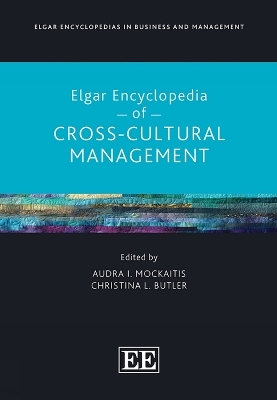
Elgar Encyclopedia of Cross-Cultural Management
Edward Elgar Publishing Ltd (Verlag)
978-1-80392-817-3 (ISBN)
Focusing on the history, continued innovation, and future significance of each topic, contributors provide insights into original frameworks and ideas, exploring new directions for research. With critical perspectives on culture at the forefront, entries cover issues including intercultural and international management, unconscious bias, cosmopolitanism, cultural intelligence, global careers,and intersectionality.
The Elgar Encyclopedia of Cross-Cultural Management is a thought-provoking resource for students, academics, and researchers in international business and management, international human resource management, diversity and management, organizational behaviour, cross-cultural psychology, sociology, and education. Practitioners will also find great value in its practical cross-cultural toolkit.
Key Features:
Over 70 entries written by pioneering experts
Employs a variety of paradigms in the examination of culture and management
Incorporates interdisciplinary angles and connects different approaches and theories
Develops new perspectives on cross-cultural management and updated conceptualizations of traditional models
Edited by Audra I. Mockaitis, Professor of International Business, School of Business, Maynooth University, Ireland and Christina L. Butler, Professor of Management, Kingston Business School, Kingston University London, UK
Contents
Preface: transcending traditional approaches to cross-cultural management xiii
Audra I. Mockaitis and Christina L. Butler
CONCEPTUALIZATIONS AND COMPONENTS OF CULTURE
1.1 Cultural archetypes 1
1.2 Cultural norms 5
1.3 Delineations of culture 8
1.4 The evolution of Hofstede’s model 13
1.5 GLOBE research programme 22
1.6 GLOBE 2020 32
1.7 Migration culture 40
1.8 Societal culture 43
1.9 Time 47
1.10 Within-country regional cultures 50
SIMILARITIES AND DIFFERENCES ACROSS CULTURES
2.1 CAGE framework 56
2.2 Convergence 59
2.3 Crossvergence 61
2.4 Cultural distance 66
2.5 Divergence 69
2.6 Ingroups, outgroups 72
INTERACTING ACROSS CULTURES
3.1 Cross-cultural compassion 77
3.2 Ethnic accents 81
3.3 Empathy 85
3.4 Intercultural communication 88
3.5 Intercultural communication skills 92
3.6 Intercultural training methods 96
3.7 Intuition and culture 100
3.8 Linguistic approaches to cross-cultural management 103
DEVELOPING CULTURAL AWARENESS
4.1 Comprehensive Global Acculturation Model 109
4.2 Cultural intelligence 112
4.3 Behavioural cultural intelligence 114
4.4 Cognitive cultural intelligence 117
4.5 Metacognitive cultural intelligence 120
4.6 Motivational cultural intelligence 123
4.7 Culture shock 126
4.8 Salutogenesis 129
4.9 Social learning theory 132
4.10 The U-Curve model of adjustment 134
4.11 Unconscious bias 137
CULTURAL IDENTITY AND DIVERSITY
5.1 Biculturalism 141
5.2 Cosmopolitan disposition 144
5.3 Critical perspectives on inclusion 147
5.4 Cultural diversity at work 150
5.5 Diaspora 154
5.6 Insider status 159
5.7 Interculturalism 161
5.8 Intersectionality 164
5.9 Intracultural diversity 168
5.10 Multiculturals 174
5.11 N-culturalism 179
THE CROSS-CULTURAL MANAGEMENT OF PEOPLE
6.1 Bicultural leadership 184
6.2 Cultural competence in global teams 189
6.3 Culture and teams 191
6.4 Expatriate adjustment 195
6.5 Expatriate management 199
6.6 Global careers 202
6.7 Global virtual teams 205
6.8 Host-country nationals 214
6.9 Parent-country nationals 216
6.10 Reluctance to lead 218
6.11 Self-initiated expatriates 223
6.12 Skilled migrants 226
6.13 A status cues approach to global team culture 228
6.14 Third-country nationals 231
ORGANISATIONAL AND INSTITUTIONAL PERSPECTIVES
7.1 Cross-cultural alliances 235
7.2 EPRG model 243
7.3 Informal networks 246
7.4 Multinational control 248
7.5 Organisational culture 253
7.6 Organisational culture change 258
PERSPECTIVES ON CROSS-CULTURAL MANAGEMENT
8.1 Compassion fatigue 262
8.2 Constructive intercultural management 266
8.3 Critiques of cross-cultural management 272
8.4 Cultural diplomacy 276
8.5 Cultural sensemaking 278
8.6 Etic and emic 280
8.7 Functional, (neo-)Institutional, and Critical Event (FICE) perspectives 283
8.8 Intercultural structuration 291
8.9 Interpretive cross-cultural management 299
8.10 Positive cross-cultural management 305
8.11 Recontextualisation 308
8.12 Vulnerable researcher 313
| Erscheinungsdatum | 02.11.2024 |
|---|---|
| Reihe/Serie | Elgar Encyclopedias in Business and Management series |
| Verlagsort | Cheltenham |
| Sprache | englisch |
| Maße | 169 x 244 mm |
| Themenwelt | Schulbuch / Wörterbuch ► Lexikon / Chroniken |
| Wirtschaft ► Betriebswirtschaft / Management ► Unternehmensführung / Management | |
| ISBN-10 | 1-80392-817-4 / 1803928174 |
| ISBN-13 | 978-1-80392-817-3 / 9781803928173 |
| Zustand | Neuware |
| Haben Sie eine Frage zum Produkt? |
aus dem Bereich


